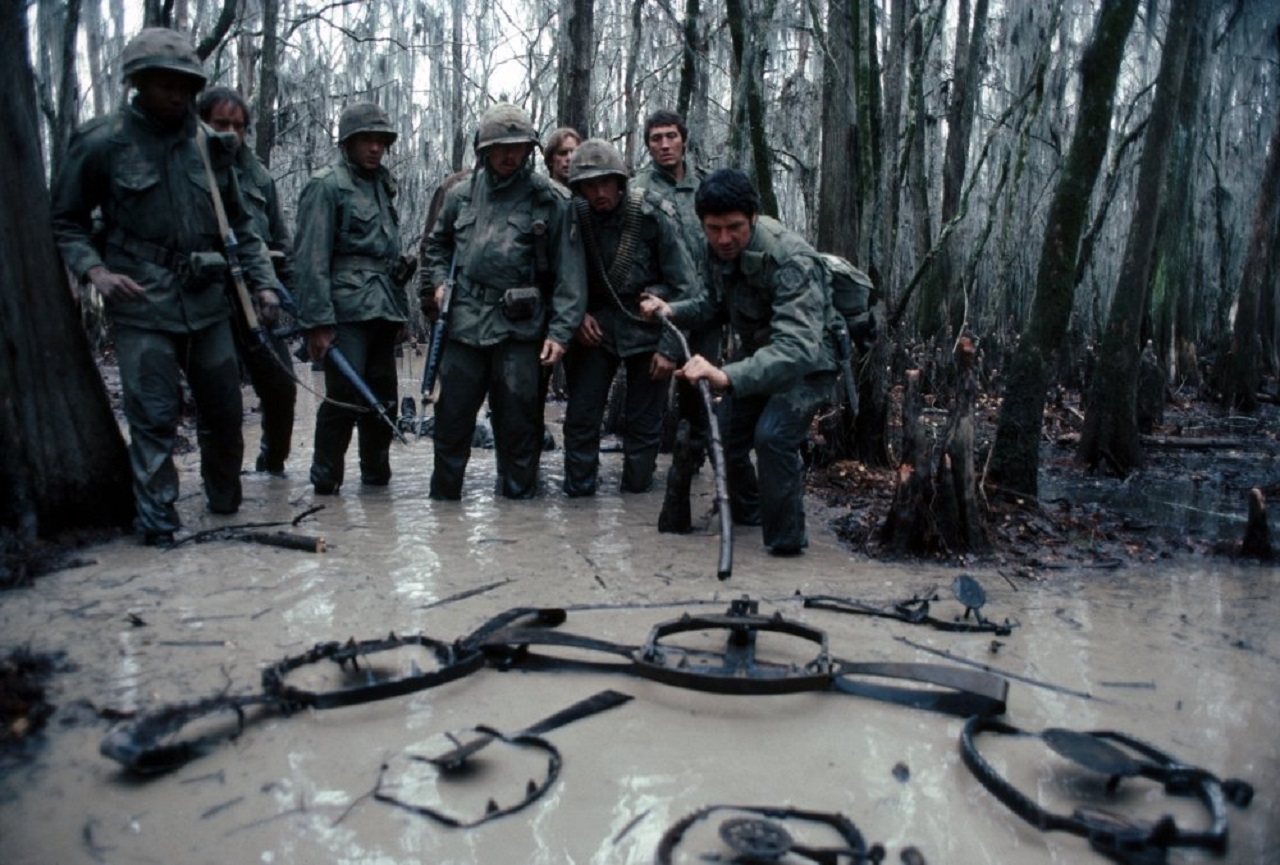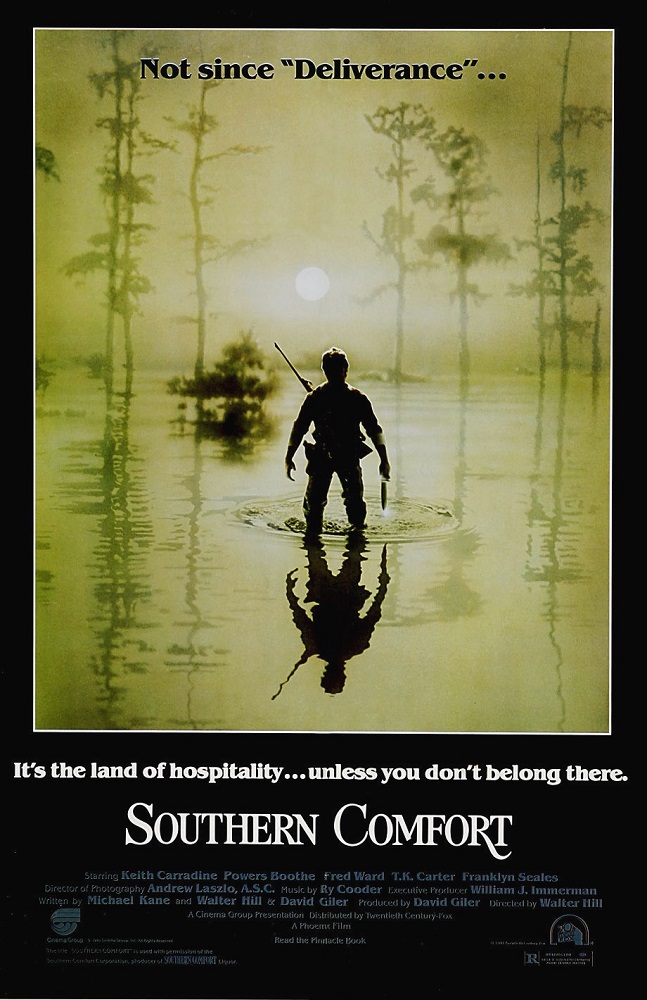Crew
Director – Walter Hill, Screenplay – Walter Hill, David Giler & Michael Kane, Producer – David Giler, Photography – Andrew Laszlo, Music – Ry Cooder, Special Effects – Larry Cavanaugh, Production Design – John Vallone. Production Company – Cinema Group Venture/Phoenix.
Cast
Powers Boothe (Charles Hardin), Keith Carradine (Spencer), Les Lannom (Casper), Fred Ward (Reece), Carlos Brown (Coach Bowden), Lewis Smith (Stuckey), T.K. Carter (Tyrone Cribbs), Franklyn Seales (Simms), Peter Coyote (Poole), Brion James (Trapper)
Plot
Louisiana, 1978. A squad of Louisiana National Guard soldiers head into the bayous on overnight training manoeuvres but become lost. They take the canoes of some Cajun trappers to cross a river. Upon seeing the Cajuns, one trooper opens fire on them with blanks, only for the Cajuns to return fire with real bullets and kill the group’s sergeant. Leaderless, the group take a Cajun trapper prisoner and blow up his cabin. This serves to provoke the other Cajuns who pursue the soldiers through the bayous, slowly annihilating their numbers. With only blanks in their guns, all the group are left with to defend themselves are their bare hands.
When he made Southern Comfort, Walter Hill was just starting to emerge as one of the better action movie directors of the 1980s. Behind him, Hill had made the likes of the great and underrated chase film The Driver (1978), the cult gangland film The Warriors (1979) and the acclaimed Western The Long Riders (1980). Ahead for Hill would be the Eddie Murphy comedy 48 Hrs. (1982) and its sequel, Extreme Prejudice (1987), the Arnold Schwarzenegger vehicle Red Heat (1988), Geronimo: An American Legend (1993), Wild Bill (1995) and Last Man Standing (1996). Although he has dropped off since the late 1990s, Walter Hill was one of the best and most underrated action-movie directors of the 1980s.
Hill has also ventured into genre material upon several occasions – most notably with the excellent blues music film Crossroads (1986) about an aging musician who has sold his soul to the Devil; the deeply troubled science-fiction film Supernova (2000); and The Assignment (2016) about a hitman seeking revenge after gender reassignment surgery was forced onto him. Hill was also once announced as the director of Alien (1979), before the project was handed over to Ridley Scott, although he is listed as a co-producer on the film and all of the sequels. Hill also co-produced the tv series Tales from the Crypt (1989-96).
Southern Comfort buys into the Backwoods Brutality cycle that emerged in the 1970s in films like The Texas Chain Saw Massacre (1974), The Hills Have Eyes (1977) and in particular Deliverance (1972) to name the most famous among many. These films tended to portray a deep schism between unassuming city folk and the people living in backwoods America, who were portrayed as being in a state near to barbarism, even cannibalistic, and most of all harbouring a deep-seated psychopathic resentment of all city slickers. Southern Comfort is really Deliverance with action-movie colours. In fact, Southern Comfort is very much what one might imagine if director John Milius – best known for male rites of passage films like Conan the Barbarian (1982) and Red Dawn (1984) – were let loose on a Friday the 13th entry.

Walter Hill does an excellent job in creating an edgy atmosphere from the dismal, washed-out swamps – the film takes place entirely in a suffusion of luminous monochrome greys. Hill is also aided immensely by Ry Cooder’s beautifully evocative score. The characters of the soldiers are slim but effectively drawn. Against them, the Cajuns are made into shadow figures, only seen flitting distantly through the trees. (If modern media’s portrayals of Cajun culture as seen in films like Belizaire the Cajun (1986), No Mercy (1986), The Big Easy (1987) and episodes of Miami Vice (1984-9) are at all accurate, then it is possibly one of the most mysterious and fascinating of communities living inside the USA today – although one can hardly have imagined they were particularly happy about their portrait in Southern Comfort).
Hill’s captivating editing of the climactic chase through the Cajun township to the sounds of their folk music is memorably haunting. Some of the situations entered do occasionally verge on the cliché – characters trapped in quicksand, or else involve complicated set-ups on the part of the Cajuns – falling trees, spike traps – that are difficult to believe when one considers the effort required to set them up and then ensure the characters travel in that particular direction.
The downside of Southern Comfort is also that when Walter Hill tries to draw the atmosphere and mood out of his characters, the dialogue only becomes shallow. Nevertheless, what Hill does create in terms of atmosphere makes Southern Comfort a memorably moody and haunting film.


